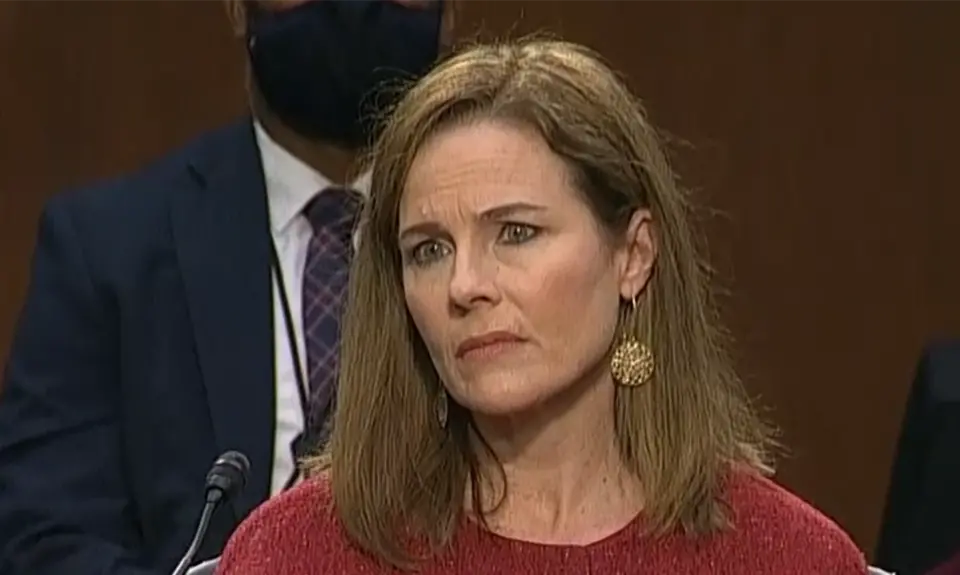“Confirmed Judges, Confirmed Fears” is a blog series documenting the harmful impact of President Trump’s judges on Americans’ rights and liberties. Cases in the series can be found by issue and by judge at this link
Trump justices Neil Gorsuch, Brett Kavanaugh, and Amy Coney Barrett cast the deciding votes in a Friday night ruling to grant a dangerous special exemption to religion from COVID-19 health rules, just as they have done in several prior cases since Barrett replaced the late Justice Ruth Bader Ginsburg. The 5-4 April ruling was in Tandon v Newson.
Among its other actions to combat the spread of the COVID-19 pandemic, California promulgated limits on private indoor gatherings, providing that whatever their objective, whether for religious, social, political, or other purposes, they are limited to three households at a time. This was based on determinations by “public health experts,” who explained that such gatherings are “likely to be longer,” in “smaller and less ventilated” settings, and in situations where mask-wearing and social distancing are “less likely” and “more difficult” to enforce than activity in commercial establishments, where more people can be present at one time. Activity outdoors or in larger religious and other institutions was not subject to these restrictions.
A pastor and another individual challenged the indoor gathering limit, claiming that they wanted to conduct private indoor worship services and Bible study sessions at people’s homes with larger numbers of people. The suit also originally included individuals who wanted to hold larger gatherings for political, secular educational, and other purposes.
A district court denied a preliminary injunction against the limits, and a panel of the Ninth Circuit similarly denied an emergency injunction pending appeal. Although one judge nominated by President Trump dissented, the majority included another Trump judge and a judge nominated by President George W Bush. After carefully analyzing recent Supreme Court rulings and the facts in the case, the majority concluded that religious gatherings in homes are not “comparable – in terms of risk to public health or reasonable safety measures” – to “commercial activities” or “religious activities in public buildings”, and that the state’s limits were “neutral and generally applicable” when “compared to analogous secular in-home private gatherings,” so that injunctive relief against the limits was not justified.
The pastor and one other person who objected to the limits for religious activities sought an emergency injunction from the Supreme Court. Even though the state explained that the restrictions would no longer be in effect by April 15, Trump Justices Gorsuch, Kavanaugh, and Barrett, along with Justices Thomas and Alito, issued an unsigned opinion on Friday night, April 9, granting the request. Chief Justice Roberts stated he “would deny the application,” and Justices Breyer, Kagan, and Sotomayor dissented.
Despite the court of appeals’ careful analysis, the majority claimed that the state “treats some comparable secular activities more favorably than at-home religious exercise,” maintaining that despite the record below, “hair salons” and “retail stores” were “comparable” and the limits thus violated the First Amendment by disfavoring religion. As to the change set to take effect in less than a week, the majority claimed that the state has a “track record” of “moving the goalposts” and that there was a “constant threat” that the limits would be reimposed.
Justice Kagan strongly dissented, for herself and Justices Breyer and Sotomayor. She explained that the state was treating private religious gatherings “exactly” like truly comparable private secular gatherings, and was thus complying with the First Amendment. Particularly given the expert evidence on the particular health risks of such private gatherings, as discussed above, Kagan stated that mandating that the state treat private religious gatherings like “hardware stores and hair salons” was like requiring it to “equally treat apples and watermelons.” Although the evidence in the case may be “inconvenient” for the majority’s ”preferred result,” she continued, it has “no warrant to ignore the record” as well as the law.
Like too many others, this case shows the impact of Trump justices Kavanaugh, Gorsuch, and Barrett, particularly the replacement of the late Justice Ruth Bader Ginsburg with Justice Barrett, which has led to a half dozen rulings like this one granting dangerous exemptions to COVID-19 public health measures for religion. The ruling illustrates the importance of our fight over the nation’s federal courts.
